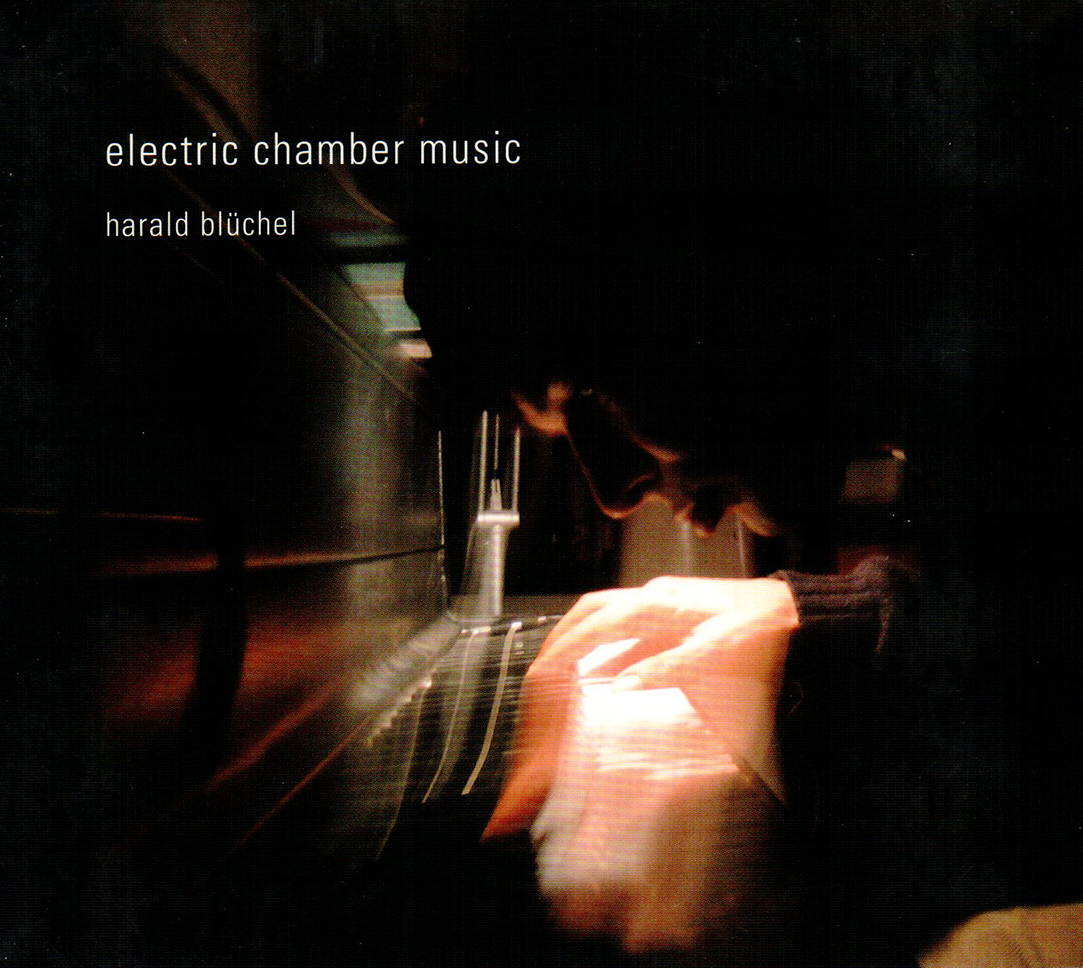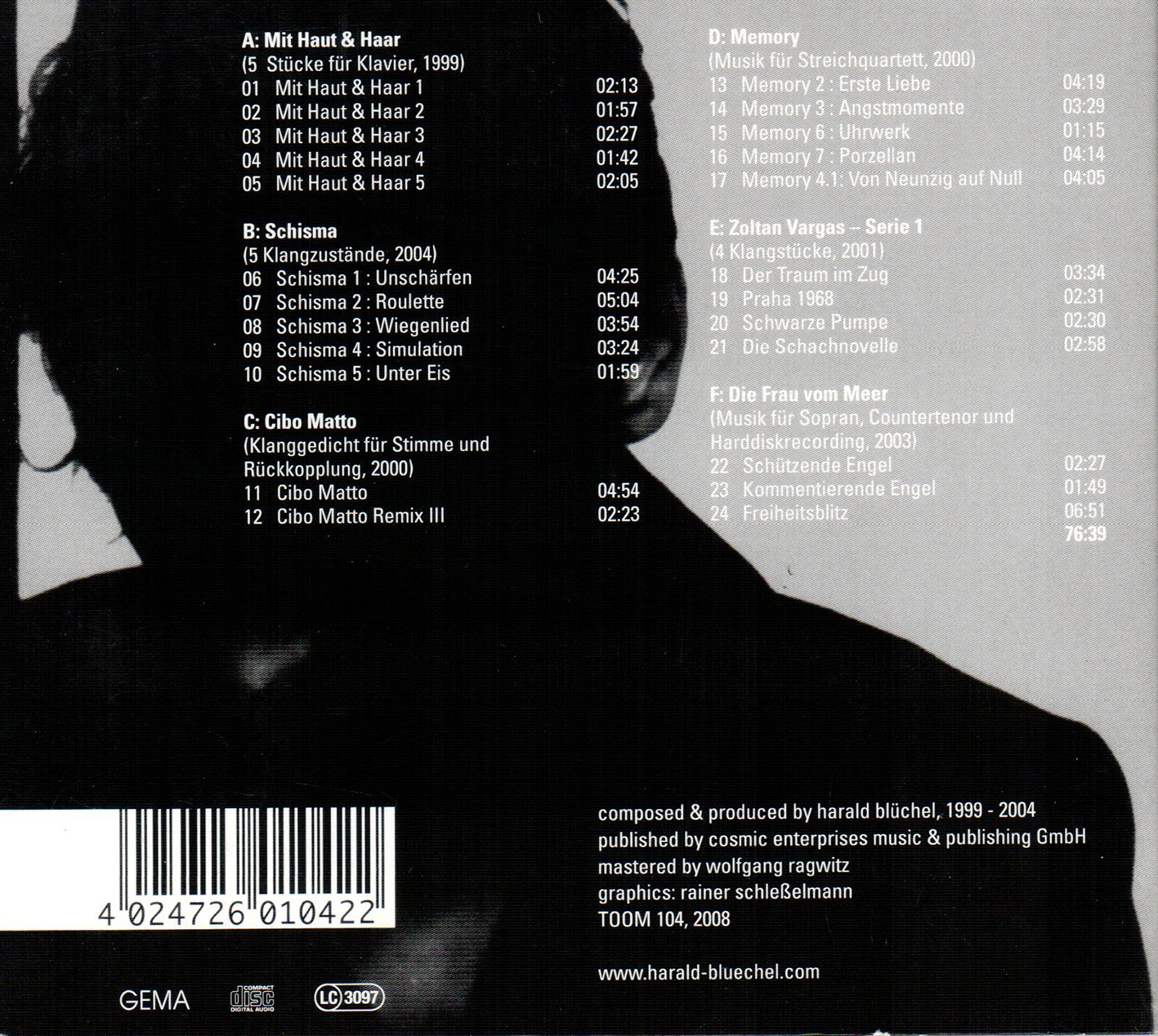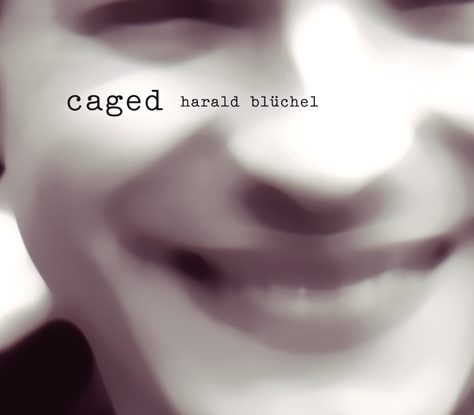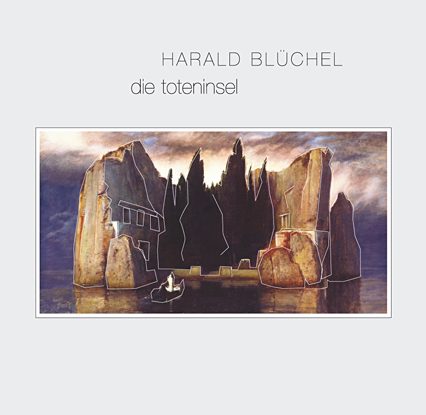

Produced between Nov. 1999 and Jan. 2004 I Released in April 2009 on time out of mind-records I Format: CD
A: Mit Haut & Haar (5 pieces for piano, 1999)
01 Mit Haut & Haar 02:13
02 Mit Haut & Haar 2 01:57
03 Mit Haut & Haar 3 02:27
04 Mit Haut & Haar 4 01:42
05 Mit Haut & Haar 5 02:05
B: Schisma (5 Tone Shapes, 2004)
06 Schisma 1 : Unschärfen 04:25
07 Schisma 2 : Roulette 05:04
08 Schisma 3 : Wiegenlied 03:54
09 Schisma 4 : Simulation 03:24
10 Schisma 5 : Unter Eis 01:59
C: Cibo Matto (Tone poem for Voice & Feedback, 2000)
11 Cibo Matto 04:54
12 Cibo Matto Remix III 02:23
D: Memory (Musik for String Quartet, 2000)
13 Memory 2 : Erste Liebe 04:19
14 Memory 3 : Angstmomente 03:29
15 Memory 6 : Uhrwerk 01:15
16 Memory 7 : Porzellan 04:14
17 Memory 4.1: Von Neunzig auf Null 04:05
E: Zoltan Vargas – Serie 1 (4 Tone Pieces, 2001)
18 Der Traum im Zug 03:34
19 Praha 1968 02:31
20 Schwarze Pumpe 02:30
21 Die Schachnovelle 02:28
F: Die Frau vom Meer (Music for soprano, countertenor ans hard-disk-recording, 2003)
22 Schützende Engel 02:27
23 Kommentierende Engel 01:49
24 Freiheitsblitz 06:51
composed & produced by harald blüchel, 1999 – 2004
published by cosmic enterprises music & publishing GmbH
mastered by wolfgang ragwitz
graphics: rainer schleßelmann
TOOM 104, 2008
NOTES:
The pieces on „Electric Chamber Music“
The third and final piece “electric chamber music” combines six completely independent works that were created and completed between 1999 and 2004.
A: Mit Haut & Haar (5 pieces for piano, 1999)
This music accompanies the documentary film of the same name by Martina Döcker & Crescentia Dünsser (ZDF/ARTE, 1999). Six elderly women from different geographical and social backgrounds recount their private experiences over the past century. The source of their reminiscences is found in their body, their spirit, their soul. From childhood memories, which are deeply ingrained in the body, to memories of the time during World War II and ultimately to fragmented thoughts on ageing and death. These are all combined with camera tracking shots of the ladies’ physical appearance resulting in distinctive “Landscapes from times passed”.
B: Schisma (5 tone shapes, 2004)
In 1991, I composed music for Sylvia Kirchhof’s Art-video “The Fly swatter”. The film is based on the Super-Eight footage about twelve patients diagnosed with manic depression. As I was working, I realized almost amusedly, how easily I found I could translate what I was seeing into a tonal context. A good ten years later, while revisiting the theme with “Caged”, I recognized what I had nonchalantly experienced at the time as an inspiring game, for what it actually was: an unconscious identification, a direct ability to comprehend, a memory, and an act of revisiting my own personal spiritual states.
With these insights in mind, I revised the five tonal pictures in 2004.
C: Cibo Matto (tone poem for voice and feedback, 2000)
Lyrics and Voice: Sabine Sölbeck
cibo matto
lean the backs softly
against the squares of the leather upholstery
and dampen the noises from the street, that
the window glass animatedly reflects.
hands lift the glasses to the mouth
hands lift kneeling the glasses to the mouth
to the mouth
and the mouth takes
the mouth takes the sweet liquid
the sweet
sweet to the swaying melody
sway yourself
to the swaying melody
as all senses love the night
that inhales us
breathes and we it. and
we its reflective brilliance
of lights
of colors
of melody
out
escape
movement
emotion
moment
all the senses love the night
that leads us on the path
in the warmth
in the fluttering light
in the togetherness of loneliness
in the loneliness of togetherness
in the defiant tam-tam of the city
tam-tam
tam-tam
in order to stop the ordinary
in order to hold on to the extraordinary
without doubt
out
escape
movement
emotion
element
only the excerpt of an observation
seized, the night, the timeless
transport of human bodies
passing in the middle on rails, arranged in bucket seats
and further right bodies
in double or four-packs
in a panel sheet wreck
passing the distortions of the frosted glass
without coming to a concrete arrangement of a style
neither cool nor warm
but directly acute
acrid
cool
warm
direct
or to stop
to take a certain seat
to bring the hands to the mouth
and share language
and glances
and laughter
and love
to the flame on the table
blazing.
on the window glass legs and bodies run past again in two directions
moving step by step forwards on the wet night street
and in it the lights a thousand times broken
the flame darts in a warm flash upwards on the frosted glass
it absorbs the emotion
and perhaps the sin
the flame splutters a prayer to the frosted glass that is answered
and the game picks up.
hands thrust curtains apart
creating new avenues, in which to throw
glances
laughter
love
the flame looks into the night
it may flicker and in that moment moisten our lips.
at dawn
dread
gray.
(translated by Bruce Stout)
D: Memory (Music for string quartet, 2000)
MEMORY – a video opera by Otto Kukla / Theater Neumarkt Zürich, 2000 performed by AMAR QUARTETT.
Anna E. Brunner: violin – Lorenz Gamma: violin – Hannes Bärtschi: viola – Maja Weber: cello
(…) it needs a motor that keeps driving forward. The Amar-Quartett is sitting lined up between video screens and microphones. Harald Bluechel alias Cosmic Baby has written a thrilling piece for four young string musicians. It is disjointed, repetitive and expressive, rising up only to fall away, pathetic and strange. The cello scratches away repetitively, the violins are taut, high and shrill. The music is the heart beat of the performance.(…)
Peter Müller, Neue Züricher Zeitung 01.07.2000
(…) between young and old, between the reality down below and the reality up above, Otto Kukla, in charge of direction, stage set and video, has suffused the piece with a musical current. It drives, beats like a pulse, is hectic then soft, a fascinating carpet of sound á la Michael Nyman, serving as the undertone of three biographies in which one, two motives surface again and again – echoes as they appear in daily life. Harald Bluechel alias Cosmic Baby, who discovered electronic music on his way to becoming a concert pianist, has composed a piece titled “Memory” for Amar, the Zurich string quartet. The four young musicians, already recipients of numerous prizes, sit between screens and actors, a cello comments on the memory of “Grandma” and her terrier, the dash of the quartet sketches the hail of bombs and the nightmarish sprint to the safety of the bunker (…)
Alexandra M. Kedves, Tages Anzeiger, Zürich 01.07.2000
E: Zoltan Vargas – Series 1 (4 Tone Pieces, 2001)
Train Dream
the night smokes its last cigarette
before the dawn.
at a window seat in the “Hungary” Budapest-Berlin
I awake from a dream.
Prague 1968
kundera on the brain
knocking in hot Prague 1968
a glimmer of socialism
with a human face
Black Pump
rusty giants
perish
like insects on their backs
on a wounded, blackened landscape.
The Royal Game
eight to a square
in a darkened room
blind – simultaneous
nothing else
(translation: Bruce Stout)
F: The Lady from the Sea (Music for soprano countertenor and hard-disk recording, 2003)
The Lady from the Sea by Susan Sontag after the play of the same name by Henrik Ibsen. Staging and direction by Otto Kukla. Theater Neumarkt Zurich, September 2003
Soprano: Gerlinde Sämann – Countertenor: Florian Mayr
(…) It has to do with peoples’ individual perceptions, it’s about their life-concepts, their quest for freedom and choice: how I would like to live, what is happiness, what is love, what does freedom mean to me, and how these concepts are compatible with those of others. In the play, Hartwig and Ellida’s life-concepts collide. She has chosen brackish water (this is Hartwig’s life-concept and expectation of Ellida), and attempts to stand by her choice – at the same time she has the constant longing for the open sea – a wish that is unfulfilled or at least no longer tenable: a desire for candor, no boundaries, a yearning that cannot be logically formulated.
The capitalist consciousness industry has proceeded to bring life-concepts into line, and people are drilled to live in a type of “spiritual conditioning system”. Everything should happen within what are effectively preset temperatures, a range within which one should function. This means the simulation of real feelings with two main motives: first of all the life of the individual becomes a “market”. When the human being has been remodeled into a “client”, and has been convinced of his own “freewill” so that he is unable to achieve happiness without a spiritual conditioning system, there is no option remaining other than to see his personal needs nullified by this system. In their place, the client now believes in the measures of value propagated by the system. Secondary to this arises a deliberate state of control and dependency directly linked to the system, precisely because the producer decides in reality what goods will be available (or unavailable!) “on the market” and at what price. In the play, the character of Arnholm is an appropriate example of this with his “life is completely simple, when you know what you want” – pseudo philosophy of (bogus) sovereignty. This “I know what I want” stereotype of the self-confident and successful Homo Economicus is, in my eyes, nothing more than the unconditional internalization of the standards of the system. Personalities without inner resistance, fractures, doubts and chasms are simply posited, “designed” and compliant. The character of Ellida is the comparative opposite of this, in that she can do nothing else but be true to her personal blueprint. She feels that the role-models offered to her will not make her happy. And she pays a heavy price for this: she presents an image to herself and others which is ungrateful, abnormal, crazy, sick, egotistical, neurotic and devalued. In terms of our current reality it is a competitive disadvantage for someone to go through life like her compared to someone who has been cooled to a permanent, spiritually controlled state of 19°C. (…)
Excerpt from an interview with Monika Gysel and Mats Staub, Zürich, September 2003


